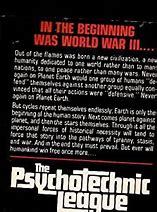21 instalments of his Psychotechnic History in the eight years from 1949 to 1957;
a 22nd instalment eleven years later in 1968;
the 43 instalments of his Technic History in the thirty-four years from 1951 and 1985.
Thus, the two series differ both in number of instalments and in length of publication history. We value both a shorter future history series and a longer one.
Both of these future history series address the Wellsian-Stapledonian theme of human civilization in its cosmic setting. For example, in the Psychotechnic instalment, "The Snows of Ganymede," underground cities have been built on a Jovian moon and there is perennial conflict about the direction that civilization should take.
Civilizations rise and fall in both series but this process is more comprehensively analysed and understood in the Technic History. Whereas Eino Valti founds psychotechnic science, Chunderban Desai explains the decline of Technic civilization.

3 comments:
Kaor, Paul!
I agree! I would have added that the two series shows Anderson at different stages of his writing career. Many of the Psychotechnic stories shows signs of an author still learning how to write. The Technic stories, except the first unrevised Flandry tales, shows a much more mature, polished, and confident style.
Ad astra! Sean
Sean: I agree. The only real way to learn how to write is to write.
You have to have the native talent to start with, but talent is cheap. There are hundreds of thousands with half a fairy good manuscript stashed away somewhere.
As Baudelaire said, "Every little bourgeois feels inspired when he sees a sunset. It's application that makes an artist."
Kaor, Mr. Stirling!
Absolutely! Application and hard work!
Ad astra! Sean
Post a Comment